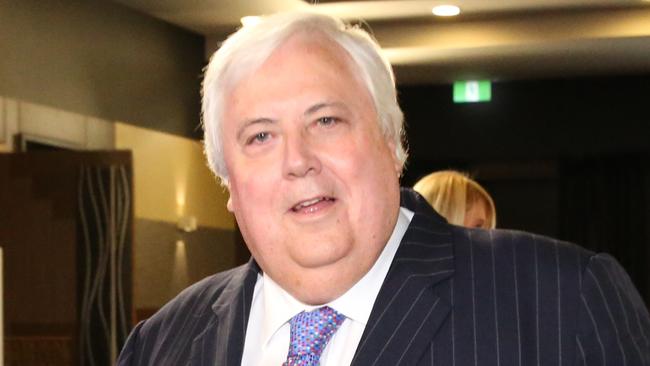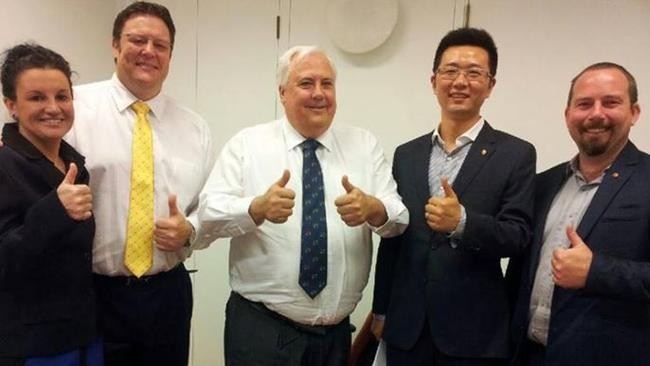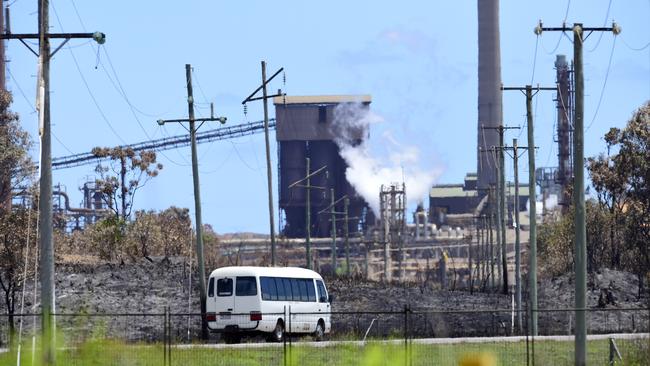Is it all over for one of Australia’s richest and most powerful men?
AN empire in ruins, an election loss looming — is it all over for self-made billionaire-turned-politician Clive Palmer?

CLIVE Palmer exploded on to Australia’s political scene with the boldness you’d expect of a self-made billionaire, and a mission to shake things up.
And for a while, it seemed that he really would.
His Palmer United Party — a handful of unlikely politicians emboldened by their maverick leader’s larger-than-life personality and enormous wealth — came from nowhere in the 2013 federal election and wound up holding the crucial balance of power in the Senate.
As for Mr Palmer, who just managed to clinch the Queensland lower house seat of Fairfax, he was rich — really rich — and seemingly more powerful than ever.
Today, as his mining empire crumbles around him, the once-unstoppable force that is Clive Palmer has so weakened he looks unlikely to survive the next election.
A new Galaxy poll today revealed Mr Palmer has virtually no support in his electorate, with his primary support sitting at just 2 per cent — down from 26.5 per cent when he took narrowly took Fairfax on preferences.
The embattled billionaire is even drawing comparisons to the likes of embattled mining magnate Nathan Tinkler and the late Alan Bond.
So when did things start to go wrong?
THE RISE AND FALL OF PALMER THE POLITICIAN
Few were happier with Queensland’s Liberal National Party’s victory in the 2012 state election than Gold Coast-bred Mr Palmer, an honorary lifetime party member and generous donor.
But his support for the LNP came to a grinding halt soon thereafter for various reasons, most notably when the new government rejected a bid from Mr Palmer’s company Waratah Coal to build a rail line from its coal mine in the lucrative Galilee Basin to a coal terminal in Bowen.
Mr Palmer was one of Australia’s richest men, although according to the Courier Mail, by 2012 his personal wealth had slipped to about $4.27 billion, down from heights of $6.28 billion in 2008.
Mr Palmer’s fortune was made largely from his mining interests, which stretched back to when he secured the rights to a massive deposit of iron ore in Western Australia’s lucrative Pilbara region in the mid-1980s.
The eccentric businessman also owned, or previously owned, five-star resorts, an A-League football team and a 100-horse stud.
Furious with the NLP, Mr Palmer did what was perhaps not surprising from the man who’d also promised to build a replica Titanic and Australia’s own Jurassic Park — he created his own political party.
And he didn’t muck around, either. Palmer United Party fielded candidates in every seat in the House of Representatives in the 2013 federal election, as well as seats in the Senate.

In the wake of election, the Palmer United Party had secured one lower house seat — Mr Palmer’s Sunshine Coast seat of Fairfax — and three seats in the Senate, taken by Glenn Lazarus, Jacqui Lambie and Dio Wang. PUP also secured an informal alliance with Australian Motoring Enthusiasts Party candidate Ricky Muir.
The ragtag party was largely introduced to the nation by way of a bizarre Sunday Night profile that inspired ridicule from coast to coast. But PUP had the last laugh — they held a controlling influence over the Senate.
The party enjoyed some prominence in Parliament — playing a major role in the Coalition’s scrapping of the carbon tax in 2014 — but internal party politics soon ran them into trouble.
Ms Lambie and Mr Lazarus quit the party and the alliance with Mr Muir crumbled. PUP also lost its two Queensland state parliament members and three in the Northern Territory, all of whom deserted the party.
Only Mr Wang and Mr Palmer, whose popularity is plummeting, remain.
Writing for The Conversation last year, Griffith University senior lecturer in politics Duncan McDonnell said PUP was an example of a “personal party”, which had its longevity tied only to the longevity of its founder-leader.
He said PUP was “doomed to end in tears”.
“Those who have left PUP have spoken of it being totally dominated by Palmer,” he said.
“They have described him as having no desire to either set up any kind of lasting state structures or to involve grassroots members.”
And this could be especially bad news with today’s damning Galaxy poll showing Mr Palmer’s political future now looks seriously in doubt.
PALMER’S CURRENT DRAMAS
Trouble in Mr Palmer’s mining empire — and in turn his political party, which has long relied on its funding — came to a head earlier this month when his company Queensland Nickel announced it was slashing 237 jobs from its Yabulu refinery in Townsville.
On Monday last week, the company made another major announcement — it was going into voluntary administration. It is understood to have debts of about $70 million.
So bad are Queensland Nickel’s financial woes, its administrators FTI Consulting told the Australian Workers’ Union it didn’t have the cash to pay out workers’ entitlements.
There is also a cloud over the job security of a further 550 refinery workers.
Mr Palmer has blamed poor nickel prices, which are at a 15-year-low, for the job cuts.

But commentators are largely blaming the company’s financial crisis on Mr Palmer having long funnelled huge amounts of money from his businesses into PUP’s coffers.
According to electoral commission figures, between July 1 2013 to June 30 2014, close to $26 million of PUP’s funding came from Palmer companies. More than $15 million came from Queensland Nickel alone.
Mr Palmer has been unapologetic about this. Despite his relative silence since administrators took over Queensland Nickel, he took to Twitter to defend his decision to use Queensland Nickel to bankroll the party, saying he did it to campaign on issues for the greater good.
“In 2013, I could have received $15m as a dividend from QNI (Queensland Nickel),” he tweeted last week. “Instead it was donated to PUP which mandated a reduction in electricity prices”.
This may not be all of Mr Palmer’s problems in the resource industries. According to The Australian, his plans for a massive coalmine in the Galilee Basin have stalled, thanks largely to his company Waratah Coal having a current cash balance of around $21,000.
Meanwhile Mineralogy, the company through which Mr Palmer would tap into a large and lucrative iron ore deposit in the Pilbara, is still locked in ongoing legal disputes with its Chinese partner.
Mr Palmer says he won’t speak publicly about the troubles at the Yabulu refinery until after the administration process is complete.
But the extent of Queensland Nickel’s financial woes is expected to be revealed when a creditors’ meeting is held in Townsville on Friday.
“At that time I will personally write to each household in the Townsville community telling them the truth of the matter,” Mr Palmer said.
The Australian today revealed that Mr Palmer used an alias, Terry Smith, to approve expenditure when he was not formally registered as a director of Queensland Nickel.
The newspaper said this added weight to the possibility that Mr Palmer acted as a “shadow director” and could face personal liability for any of Queensland Nickel’s debts or legal breaches.
As anger continues to mount over the job losses at Yabulu, there have also been calls today for Mr Palmer to resign from Parliament.
Assistant Science Minister Karen Andrews said Mr Palmer faced a “fulltime job” of ensuring sacked employees received their rightful entitlements and found future employment.
“I think he should resign and he should resign before parliament resumes next week. He has major responsibilities at Queensland Nickel or whatever the entity or entities are,” Ms Andrews, a Queensland MP, told Sky News.
“He has a responsibility to those workers to make sure he is doing everything that he can.”
But even as his resources empire crumbles, and the polls suggest he shouldn’t even bother trying to retain Fairfax in the next election, Mr Palmer remains defiant as ever.
“There’s no reason why I wouldn’t run [in the next election],” he told the ABC.
“There are a lot of people in the electorate that have given me a lot of support.”



